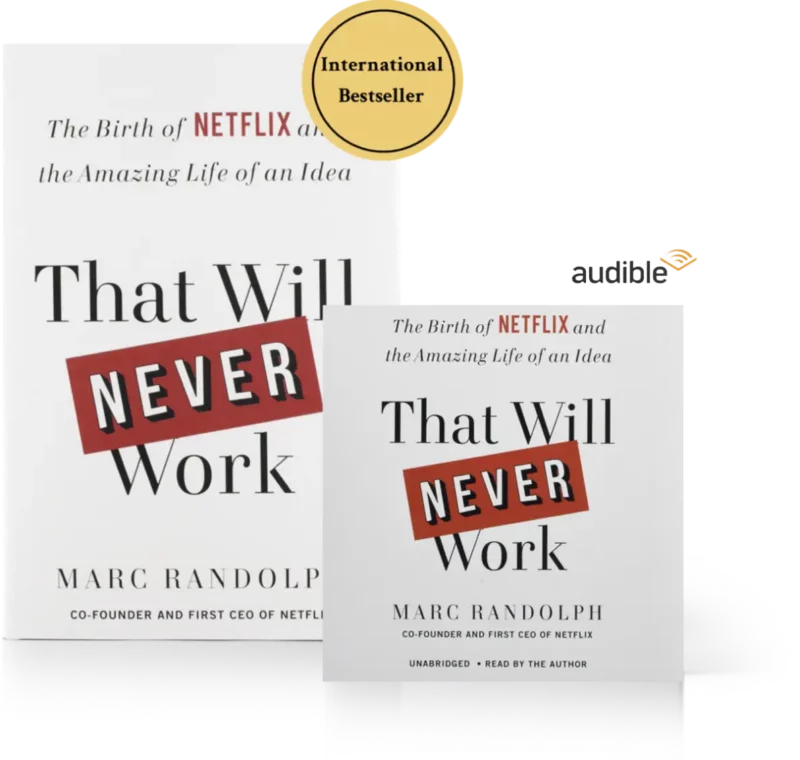You Don’t Have to Work at Goldman Sachs. I Promise.
If, in your heart of hearts, you want to be an entrepreneur, don’t be afraid to take that on.

A few years ago, as I was finishing That Will Never Work, my book about starting Netflix, I sent a draft to my eldest son, Logan. He appears a lot in its pages, growing from a kindergartner eating fluffernutters at the kitchen table to a young man in a brand-new blazer, accompanying me and Reed Hastings to New York for the Netflix I.P.O. I thought he’d be interested to see his role in the story. And since he’s a young entrepreneur now, I wanted to get his take on some of the lessons I tried to embed within the narrative.
A few days later, I got an e-mail back. He loved the book, he said, and he loved the lessons. But one thing I wish you would have spent more time on, he wrote, was the meandering path you took to entrepreneurship. People my age are pressured to focus early, to decide on a path for their life. We need permission to start an idea, not go to Goldman Sachs. You need to share more about your journey so we don’t feel bad about that decision.
Logan’s right. And I would have loved to have given the full narrative of how I ended up turning a geology degree into a three-decade career in tech. Maybe I would have done it if the book hadn’t been so tightly focused on Netflix, and if I’d had another hundred pages to work with.
Well, maybe two hundred.
Because my path to Netflix was not linear, by any stretch of the imagination. I didn’t start working in tech until I was 32. I didn’t even move to California until I was 30.
Before becoming an entrepreneur, I was:
-The worst realtor in the state of New York
-A gofer for the CEO of a sheet music company
-An aspiring brand manager for flea shampoo
-And the manager of a ski shop owned by a cotton magnate in – of all places – Memphis, Tennesee.
I’ll start in Memphis.
When I graduated from college, a man named Julien Hohenberg III offered me a job, sight unseen. Hohenberg was a client of my father, and when he heard from my dad that I was a NOLS instructor, he told my father that he had a job for me if I wanted it.
Hohenberg was one of those wealthy eccentrics with strong enthusiasms and too much money. He loved the outdoors and had purchased a ski shop located in a strip mall in Memphis called, confusingly, The Boat and Motor Mart. A few weeks after I graduated from college, with zero managerial experience, I flew down and assumed my role as the store’s manager.
My job selling ski poles to the wealthy snowbirds of Tennessee didn’t last long, though. A few months after I’d started, Hohenberg was driving back from Vail during a blizzard and glimpsed, through the curtain of falling snow, distant lights in a valley. His driver told him that they belonged to Statebridge, a ghost town on the banks of the Colorado River that had once housed a brothel and saloon and was now up for sale. A few days later, Hohenberg bought it — again, sight unseen.
Now he needed someone to manage the property, which he was going to start up as a kind of dude ranch hotel theme park. He would re-open the saloon, put in a restaurant, open a hotel, all of it in an old ghost town in the shadow of the Rockies.
Sign me up.
Did I have any experience in hospitality? No. Had I ever been in charge of more than a few people? No. Did I know the first thing about the restaurant or bar business? Again, no.
But Hohenberg sent me out to Colorado anyway. And I have to thank him for that.
Because even though I was in way over my head, I learned a lot on that job. I learned how to manage cash flow, how to fire a perennially tardy (and often intoxicated) cook. I learned how many people you can fit on five hundred square foot dancefloor and what to do when the band wants more money than they were promised. I learned that if you mixed equal parts men, women, pool table, and liquor, a fight would result in less than twenty minutes.
I learned how to interact with wealthy Vail skiers looking for an “authentic experience” and how to wrangle the real cowboys and railroad workers who provided it.
I learned how to market a new business. I spent every weekend papering the public bulletin boards of Vail and Steamboat with hand-drawn posters and coming up with promotions.
And in the winter, when we were closed? I learned that it wasn’t all so bad to be stuck with a lot of “leftover” liquor and a walk-in-freezer that needed to be thoroughly emptied before ordering new supplies for the coming spring.
All of these experiences were useful to me, later in my career. (Well, maybe not the liquor and the walk-in freezer.)
But I didn’t plan on having those experiences. I didn’t think they’d come in handy for a long-term career as an entrepreneur. I wasn’t trying to put anything on my resume. I was just doing what interested me. And when the year was over, and Julien Hohenberg III sold the ghost town, and I was out of a job?
Well, that’s when I rode my bicycle cross country from Colorado to New York, ready to become the first realtor in Chappaqua to wear cowboy boots. But that’s a story for another book.
The truth is, entrepreneurship is not a calling with a linear path, like medicine or law, or finance. I should know — my brother is an investment banker. Like me, he often visits Middlebury College to talk to students about their career options. A couple of times, he and I have ended up in separate rooms on campus, each of us counseling some of the country’s brightest college kids about their career paths. We call it “battling for the souls of America’s youth.” He tells them all about junior analyst positions with ninety-hour work weeks and starting salaries in the six figures. I tell them all about start-up life, living three to a room in a San Francisco hovel, and eating Top Ramen for dinner.
The kind of kid who wants a stable, linear path — and immediate money — goes with my brother. The kind whose passion is equally intense, but a little less linear, often ends up with me.
And that’s fine. If you want to be a banker, you should be a banker. Or if you want to be a lawyer, a doctor, an accountant — all jobs with clear paths and five-year plans — do it! But make sure you’re doing it for the right reasons. If, in your heart of hearts, you want to be an entrepreneur, don’t be afraid to take that on.
That’s the number one thing I tell those kids at Middlebury when I’m battling for their souls: Stop worrying so much about your life following a straight line. The happiest, most successful entrepreneurs I know do what they do because they followed a passion, not because they had a plan. The best journeys rarely proceed linearly. Relax. Find something that strikes your interest. And don’t be afraid to take a trail just because you can’t see the end.
RECOMMENDED FOR YOU
Congratulations on Landing Your First Job...
Podcast Episode 72
Is it a Culture Problem or a Hiring Problem?
October 25, 2022 • 38 min
